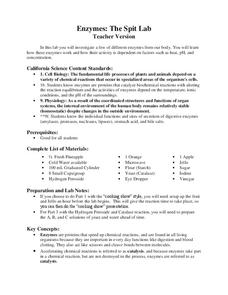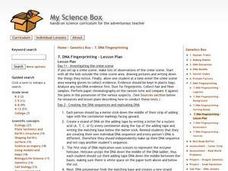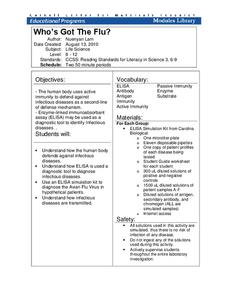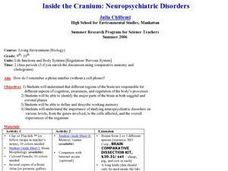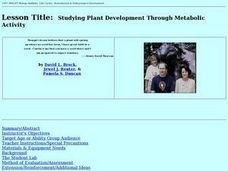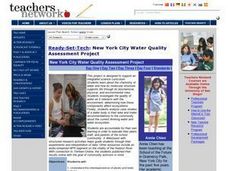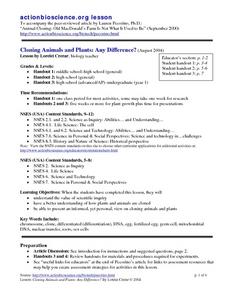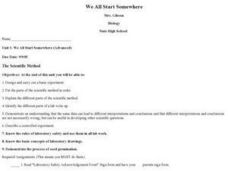Curated OER
Lotto or Life: What Are the Chances?
Though the website does not seem to have the mentioned video, a reding and lottery style games simulate the chances of finding intelligent life somewhere other than Earth. Without the video, this lesson is short, but it can be a useful...
NOAA
Watch the Screen!
Can a sponge cure cancer? Life science pupils visit the drugstore under the sea in the fifth lesson of six. Working groups research the topic then get hands-on experience by testing the inhibiting effects of several plant extracts...
Curated OER
Health Care
Students analyze information and draw conclusions about the reality of human life expectancy; the battle between health care technology and our own internal time clocks. Students answer questions such as "Why does aging occur and can...
Curated OER
Breaking It Down
Seventh graders explain the mechanism of digestion. In this biology lesson, 7th graders perform an iodine test to check for the presence of starch. They discuss how energy travels through the food chain.
NASA
Decomposers Get Energy From Dead Things
When life gives you mold, make penicillin. Scholars design an inquiry experiment to determine what causes rotting and mold growth. It also covers decomposers and the important role they play for other living things.
LABScI
Enzymes: The Spit Lab
Enzymes in our bodies each have a job to do. Learn the factors that affect the activity of some enzymes using the third activity of an informative 12-part biology series. A three-part laboratory activity asks teams to investigate how...
Curated OER
Cut-off Genes
Investigate the relationships between different deep-sea organisms by DNA sequencing. A worksheet provides instructions for DNA sequencing and space to work. They simulate gel electrophoresis by cutting out paper "DNA strands."...
Curated OER
DNA Fingerprinting
Students study the process of DNA Fingerprinting and how DNA Fingerprinting is used in solving crimes. They examine a crime scenario that involves collecting DNA Fingerprinting information from blood collected at the crime scene. They...
Cornell University
Who’s Got The Flu?
Become an immunologist for the day. Scholars elicit the use of the enzyme-linked immunoabsorbent assay (ELISA) to diagnose an infectious disease. Through the process, they learn about the immune system response to infectious diseases.
Curated OER
Watch the Screen!
Students explore screening processes for biological activity. In this deep sea lesson students complete a lab activity.
Curated OER
Inside the Cranium: Neuropsychiatric Disorders
Students analyze different regions of the brain which are responsible for different aspects of cognition, awareness and regulating the body's process.
Curated OER
This Life Stinks
Students study cold seeps and see how organisms obtain energy from methane. In this sinkholes lesson students examine the relevance of chemosynthesis to communities.
Curated OER
The Heart of the Matter
Upper elementary pupils learn about the blood transportation system and anatomy of the human heart. They fill in an outline of the human heart (not included) focusing on the flow of blood to and from the heart. Using stethoscopes,...
Curated OER
The Effect of Natural Selection on Genes, Traits and Individuals
Rotating through five stations, evolutionary biologists explore the question of how changes in DNA facilitate the changes in a population over time. High-quality, colorful cards of animals, skeletons, skulls, and DNA sequences can all be...
Curated OER
Movement, it's FUN-damental!
Students discover how muscles work. In this biology lesson plan, students explain the causes of fatigue and muscle soreness. They create graphs and compare results with their classmate.
Curated OER
Growth Stages 1: Infancy and Early Childhood
Learners explore biology by completing a human growth worksheet. In this child development lesson, students read assigned text about the human birth process and the ideal growth patterns for a child. Learners answer study questions about...
University of Minnesota
What's the Deal? Addiction Card Game
Addiction is a big deal! Playing a game of cards helps learners understand the concept of addiction. Through their analysis, they examine the potential for addiction and how it varies for each individual.
Curated OER
Studying Plant Development Through Metabolic Activity
A hands-on activity which allows students to learn about cellular respiration. This instructional activity contains a range of investigations testing the rates of cellular respiration to demonstrate the relationship between metabolic...
Curated OER
New York City Water Quality Assessment Project
Students investigate the chemistry of water and how its molecular structure supports life through its biochemcial, physical, and environmental roles. They investigate the quality of water as it interacts with the environment. Students...
Curated OER
Cloning Animals and Plants: Any Difference?
Students examine the process in which plants and animals are cloned. They compare and contrast the two procedures and determine if there is a difference. They share their views on cloning to the class.
Curated OER
People Are Like Peas in a Pod
Students experiment with peapods to show the diversity of individual within a population. They examine dominant traits, recessive traits, genotypes, and phenotypes and show the process of making a Punnett Square.
Curated OER
This Old Tubeworm
High schoolers explain the process and significance of chemosynthesis. They develop their own graphic based on data of a biological community. They estimate the age of a given species as well.
Curated OER
We All Start Somewhere
Students demonstrate an understanding that the same data can lead to different interpretations and conclusions and that different interpretations and conclusions are not necessarily wrong, but can be useful in developing other scientific...
Curated OER
How Do Cells Reproduce?
Learners discuss the importance of reproduction of cells. They identify and describe the stages of Mitosis. They discover what happens to chromosomes and DNA during reproduction.





